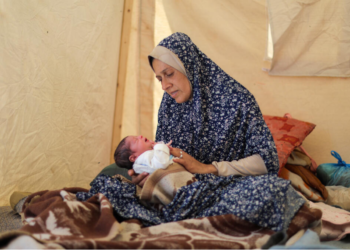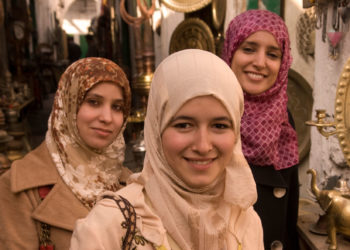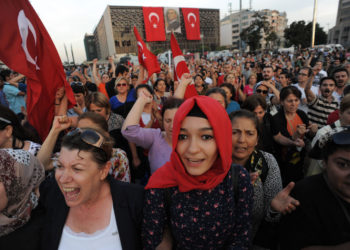This post is also available in: Français (French) العربية (Arabic) VO
Country context
Feminist contexts of Mediterranean countries, as written by journalists from the region.
Gaza’s Women and Girls are running out of time
PRESS RELEASE Cairo – April 10, 2025 – UNFPA– The situation in Gaza has become unbearable for women and girls. What was once a fragile ceasefire—a faint beacon of hope for peace and recovery—has now vanished. As Israel’s blockade of humanitarian aid extends into its second month, the crisis has spiraled into catastrophe. Women and families are simply fighting to survive. Since the resumption of hostilities on 18 March, more than 500 children and 270 women have been killed, a devastating testament to the indiscriminate brutality of this war. Nearly two-thirds of Gaza is now a declared ‘no-go zone.’ As women-led organizations reported to UN Women, "nowhere is safe". Uprooted...
Women in Gaza cut off from accessing maternal health supplies as aid blockade enters fourth week
PRESS RELEASECairo – March 25, 2025 – UNFPA – The ongoing aid blockade on Gaza is severely undermining access to essential health care for women and girls, as supplies run dry and hospitals once again come under attack. This marks the longest suspension of aid to Gaza since 7 October 2023.In March 2025, the Ministry of Health reported critical shortages of three essential maternal health drugs: medicines used to induce or augment labour; blood plasma to treat women who are hemorrhaging, and medicine to treat pre-eclampsia- all vital to preventing maternal deaths and complications.Meanwhile, 54 ultrasounds to monitor fetal health; nine incubators that keep premature and low-birth-weight newborns alive; and...
Feminism in Greece: a brief overview
Mediterranean countries have a long way to go when it comes to achieving gender justice. The region’s sunny corner is no exception, as it is infected by the same long-lasting pandemic of gender-based violence, discrimination and femicides. An ongoing #MeTooGr movement, which started around 2020, reignited the feminist movement in Greece. The social justice warriors are now fighting to change sexist narratives and systemic inequalities.
Feminism in Malta: a brief overview
A stronghold of the Catholic Church, the small Mediterranean island nation of Malta’s culture and norms are firmly rooted in religious tradition. Despite the country progressing in civil freedoms, such as the introduction of the right to divorce in 2011 and a marked increase in female participation within the workforce, the fight for reproductive rights and against violence directed at women continues.
Feminism in Libya: a brief overview
Since the 2011 uprising, the ongoing reality proves that 10 years on, Libyan women are still in the same place in terms of their rights, fighting every day for their basic rights but without achieving any notable results or impact.
Feminism in Morocco: a brief overview
Since the 2000s, the status of women in Morocco has seen encouraging progress. Democratic openness has fostered the emergence of the movement of women, just as it has, conversely, contributed to the democratic transition. However, while progress is undeniable, gender parity has not been achieved and remains a major challenge for the country.
Feminism in Croatia: a brief overview
According to the Gender Equality Index of European Institute for Gender Equality, with 57.9 out of 100 points, Croatia ranks 20th in the EU on the Gender Equality Index. Croatia’s score is 10.0 points below the EU’s score...
Feminism in Lebanon: a brief overview
In Lebanon, unlike most Arab countries, the state follows no religion. While equality between citizens is a principle enshrined in the constitution, it is not reflected in many of the legislations, measures and practices impacting different aspects of citizens’ lives, especially the personal status sectarian laws which govern most personal family affairs in the country.
Feminism in Montenegro: a brief overview
When it comes to gender equality in Montenegro, the key legislations are the “Law on Gender Equality” adopted in 2007 (and amended in 2015) and the “Law on the Prohibition of Discrimination” adopted in 2011. However, the implementation of laws in Montenegro remains weak.
Feminism in Palestine: a brief overview
In return for their heroic role and their partnership with men in all areas of the liberation struggle, women are 'rewarded' with a worrying quality of life and rights situation.
Feminism in Spain: a brief overview
Feminists in Spain demand a radical end to the structural discrimination of women and the precariousness and poverty of women, and demand to stop the growing evolutionist agenda of the far right in the country.
Feminism in Turkey: a brief overview
Women’s organizations in Turkey are still actively fighting against domestic violence, reduced sentences on grounds of “provocation” in femicide cases, lack of women’s participation in the workforce and political representation, and all forms of gender-based discrimination. There are also advocacy campaigns for the right to self-defense of victims of violence.
Feminism in Egypt: a brief overview
The feminist movement in Egypt is regarded as the oldest organized feminist movement in the Arab world; it evolved in the last quarter of the 19th century, and the first women’s NGO was established in 1891.
Feminism in Tunisia: a brief overview
Often inspiring other women in the region, Tunisian women have obtained their rights and freedoms since their country gained independence in 1956. In times of democratic transition, Tunisian women are seizing the opportunity of a context of freedom of opinion to continue their struggle for full equality with the men of their country.
Feminism in Italy: a brief overview
What are the ten most important women's rights bills that have been passed since the post-war period until this day in Italy?
Feminism in Algeria: a brief overview
Women who then dared to claim equal rights were treated as “westernised”, “prostitutes”, “disbelievers” and “girls of the French party”. The argument that the Family Code was in contradiction with the Constitution in its Article 29, which provides for equality before the law was no longer even enforceable.
Feminism in France: a brief overview
In France today, feminist actions are beginning to bear fruit with public opinion. Feminism is no longer a taboo as most citizens are aware that social relations between the sexes are unequal and unfair towards women... and that this is no fake news.











































